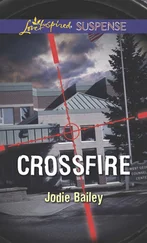He snorted. “Well, sweetheart, I didn’t know you felt that way.”
“Shut up,” Jay said, and for the first time Jack noticed the edge in his voice. “Look. I don’t really want to go into this over the phone, all right? I’ll explain when you get here.”
“But-”
A dial tone. “Shit,” Jack muttered. “This’d better be worth it.”
He had met Jay when the detective came to the school to talk about safety on Halloween. Immediately, Jay became the big brother that Jack had never had. On the steaming, laziest days of the summer, they went out in the Westonbrook crew launch to catch largemouth bass. Rods balanced in their hands, they’d drink beer and come up with outrageous scenarios to lure Heather Locklear to the small burg of Loyal.
“Think you’ll ever settle down?” Jack had asked once.
Jay had laughed. “I am so settled already, I’m growing roots. Nothing ever happens in Loyal.”
Jay stood up the moment Jack entered his office. He looked at the bookshelf, the carpet, Jack’s coat . . . anywhere but at Jack himself. “You want to tell me what was so damn important that it couldn’t wait?”
“Why don’t we take a walk?”
“What’s the matter with right here?”
Jay’s face twisted. “Just humor me, will you?” He led Jack into a conference room. There was nothing inside but a table, three chairs, and a tape recorder.
Jack grinned. “Do I get to play cop?” He folded his arms over his chest. “You have the right to remain silent. Everything you say can and will be used against you. You have the right to an attorney . . .” His voice trailed off as Jay closed his eyes and turned away. “Hey,” Jack said quietly. “What the hell?”
When Jay looked at him again, his face was completely impassive. “Catherine Marsh said the two of you have been having an affair.”
“Catherine Marsh said what?” Jack took a second look at the spare room, the tape recorder, and Jay’s expression. “Am I . . . you’re not arresting me, are you?”
“No. We’re just talking now. I want to hear your side of the story.”
“You couldn’t possibly think . . . for God’s sake, Jay . . . she’s-she’s a student. I swear-I’ve never touched her. I don’t know where she’d get an idea like this.” In spite of himself, his heart was racing.
“On the basis of the evidence we have, we’ll be bringing charges against you,” Jay said stiffly. Then his voice softened. “You may want to get yourself a lawyer, Jack.”
A curtain of rage ripped across Jack’s vision. “Why did you want me to come in here to talk if you’re going to arrest me anyway?” The accusation hung between them, and Jack suddenly realized exactly why Jay had asked for his side of the story-it had nothing to do with their friendship and everything to do with catching Jack in a confession that could be used against him in court.
Loyal was a picture-perfect town, complete with a general store, a requisite wooden bridge, and a row of white clapboard buildings that flanked the town green, mirroring the architecture of Westonbrook Academy. Jack’s home was a little cape. From his front porch, he could see the house where Catherine Marsh and her father, the Right Reverend Ellidor Marsh, lived.
What Jack had liked best about the town was that he could not walk through it without saying hello to someone he knew. If not a student, then the woman who ran the general store. The postmaster. The elderly twin brothers who had never married but served as bank tellers at side-by-side windows.
Today, though, he walked with his head ducked, afraid of seeing someone familiar. He passed kids and felt their heads crane to watch him walk by. He veered around the broom of a shopkeeper, his face lighting with embarrassment as she paused in her sweeping and stared. I am innocent, he wanted to scream, but even that would not make a difference. It wasn’t truth that held their interest; it was the fact that rotten luck might be catching.
Catherine Marsh’s house was gaily laced with pink roses that grew skyward on a trellis. He rapped sharply on the door, falling back a step when Catherine answered.
She was young and pretty, with skin that seemed lit from the inside. In that first moment, Jack saw all the times he’d hugged her after a particularly fine goal on the field, all the times he’d noticed her jersey straining against her sports bra. A wide smile spread across her face. “Coach!”
He opened up his mouth to speak, to accuse her, to ask her why, but all the questions jammed. A face appeared behind hers: Ellidor Marsh, in all his fundamentalist fury.
“Reverend,” Jack began.
It was all Ellidor needed. His face revealed an internal war for the briefest moment, and then his fist shot out and clipped Jack in the jaw.
Catherine cried out as Jack tumbled down the steps, landing in a tangle of rosebushes. Thorns cut into the summer-weight wool of his trousers. He spat out blood, then wiped his hand across his mouth.
Catherine was trying to get to him, but her father had pushed her behind his own body. Jack narrowed his eyes at the chaplain. “Did the good Lord tell you to do that?”
“Go,” Ellidor said precisely, “to hell.”
A few weeks before, Jack had been teaching the Peloponnesian War to the summer term fourth-formers. He stood in front of his classroom, his shirt sticking to his chest in this July heat. “The Spartans weren’t happy with the peace treaty they’d signed, and the Athenians were getting a little power hungry themselves. . . .” He’d glanced over the rows of flushed faces of students cooling themselves with hastily folded looseleaf-paper fans. “And not a single one of you is listening right now.”
Jack winced as one girl’s eyes actually drifted shut. He was not a big fan of Westonbrook’s summer session, offered so students could pump up their academic credits for college applications. The hundred-year-old classrooms at Westonbrook, sweatboxes all, were not conducive to learning.
Catherine Marsh sat in the front of the class, her starched collar neat against the edge of her uniform cardigan, her legs crossed primly at the ankles. “Dr. St. Bride,” she whined, “what’s so important about a war that happened twenty-four hundred years ago in a different country? I mean, it’s not our history. So why do we have to learn it?”
The chorus of agreement swept like a wave. Jack glanced from one flushed young face to another. “Okay,” he said, “we’re taking a field trip.”
He did not really have a plan in mind, beyond getting them out of those godforsaken uniforms and into something more comfortable. Swimsuits were the most obvious choice . . . each girl had one roped to her gym locker. But he also had a very good sense of the mind of sophomore girls-who would rather cut off their left arm than show off physical flaws in front of classmates who were curvier, thinner, taller . . . or in front of a male teacher. Suddenly, Jack brightened, imagining a modest way to make the kids more comfortable-a way that could even be construed as part of their daily lesson.
He led them to the cafeteria, where arthritic townies were chopping heads of iceberg lettuce into salads. “Ladies,” he said in greeting, “we have need of some tablecloths.”
He was directed toward the main hall, where first-formers through sixth-formers took meals together. Neatly folded linens were stacked in piles. Jack took one tablecloth and tossed it to a student. He reached for another, and another, until every girl in his class was holding one. “When in Rome, do as the Romans do. And when in Greece . . .” He grabbed a cloth and wrapped it around his own body. “Voilà. The toga.”
He led them to the girls’ locker room. “I want you all to put on your swimsuits, and then drape your toga. Carry out your uniforms, just in case.”
Читать дальше












